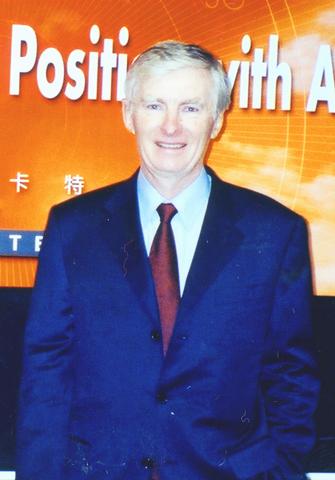The number two man at the French telecom powerhouse, Alcatel, is highly optimistic about Taiwan's third-generation (3G) market, saying the nation is poised to become one of the leading telecom countries in Asia Pacific, along with Japan and Korea.
"The time for 3G services to take off in Taiwan is going to come soon. By 2005, approximately 15 percent of citizens around the country will be 3G users," said Ron Spithill, executive vice president of Alcatel.

PHOTO: ALCATEL
Spithill explained that, with the number of broadband-Internet subscribers and mobile-phone users growing rapidly, Taiwanese demand for mobile Internet services appears high.
The executive predicted that 3G will fare better than it has in Europe since the license pricing strategy in Taiwan is much more reasonable than in Europe. "The license fees charged here are more affordable," Spithill said.
Late last year Alcatel demonstrated its growing commitment to Taiwan's telecom sector by announcing plans to invest NT$93 million (three million euros) in a 3G appliance testing center in Taipei, Spithill said.
Besides having strong ties with Taiwanese telecom giant Chunghwa Telecom Co (中華電信), Alcatel has also aligned with Japan-based Fujutsu to provide telecom equipment and solutions to 3G operators worldwide. International customers include Orange in France, TWN in Portugal, ETA in Poland and KB Impuls in Russia.
Meanwhile, one industry watcher said that, although Alcatel was awarded a NT$7.1 billion (US$218.3 million) ADSL contract with Chung-hwa Telecom last year, and these two ventures have a joint venture telecom firm, these connections may not directly benefit the French company's 3G prospects.
"Since Chunghwa is a state-run company, all business contracts have to be auctioned openly rather than choosing partners by themselves," said Nathan Lin (
Entering Taiwan in 1973, Alcatel set up a local subsidiary, Taiwan International Standard Electronics Ltd (
Meanwhile, another pundit from a government think tank said Alcatel's 3G market expectation is "over-optimistic."
"Alcatel is the wireless equipment provider, so, of course the company will try to say something positive," said Su yu-yi (
Delays in making 3G reality may slow future growth potential.
"I believe that, by 2005, 3G services will still be in the initial stage, with less than 10 percent of mobile users connecting to it," Su said.
The major hurdles -- according to the Japanese experience -- are handset over-heating, short battery life and hefty cellphone costs, Su said.
Japan's leading mobile phone operator, NTT DoCoMo, launched the world's first 3G service in October last year. But the public's reaction has not been good, with many mobile phones malfunctioning and NTT being forced to lower their market estimate for this year, Su said.
Su stressed that the foundations for a 3G service have not been laid yet. "Currently, all of the mobile operators, system builders and application suppliers are still `testing and searching' better solutions, and these steps take time and a huge investment," Su said.
Taiwan started its auction of 3G licenses last Wednesday, with six telecom conglomerates competing for five licenses to offer high-speed wireless Internet services. The bidding process is supposed to end by the end of January.
The six contenders are Taiwan Cellular Corp (台灣大哥大), Chung-hwa Telecom, Yuan-Ze Telecom Co (遠致電信), Asia Pacific Broadband Wireless Communication Inc (亞太行動寬頻), 3GO Telecommunications Corp (世界全通) and Taiwan PCS Network Inc (聯邦電信).

SECURITY: As China is ‘reshaping’ Hong Kong’s population, Taiwan must raise the eligibility threshold for applications from Hong Kongers, Chiu Chui-cheng said When Hong Kong and Macau citizens apply for residency in Taiwan, it would be under a new category that includes a “national security observation period,” Mainland Affairs Council (MAC) Minister Chiu Chui-cheng (邱垂正) said yesterday. President William Lai (賴清德) on March 13 announced 17 strategies to counter China’s aggression toward Taiwan, including incorporating national security considerations into the review process for residency applications from Hong Kong and Macau citizens. The situation in Hong Kong is constantly changing, Chiu said to media yesterday on the sidelines of the Taipei Technology Run hosted by the Taipei Neihu Technology Park Development Association. With

CARROT AND STICK: While unrelenting in its military threats, China attracted nearly 40,000 Taiwanese to over 400 business events last year Nearly 40,000 Taiwanese last year joined industry events in China, such as conferences and trade fairs, supported by the Chinese government, a study showed yesterday, as Beijing ramps up a charm offensive toward Taipei alongside military pressure. China has long taken a carrot-and-stick approach to Taiwan, threatening it with the prospect of military action while reaching out to those it believes are amenable to Beijing’s point of view. Taiwanese security officials are wary of what they see as Beijing’s influence campaigns to sway public opinion after Taipei and Beijing gradually resumed travel links halted by the COVID-19 pandemic, but the scale of

A US Marine Corps regiment equipped with Naval Strike Missiles (NSM) is set to participate in the upcoming Balikatan 25 exercise in the Luzon Strait, marking the system’s first-ever deployment in the Philippines. US and Philippine officials have separately confirmed that the Navy Marine Expeditionary Ship Interdiction System (NMESIS) — the mobile launch platform for the Naval Strike Missile — would take part in the joint exercise. The missiles are being deployed to “a strategic first island chain chokepoint” in the waters between Taiwan proper and the Philippines, US-based Naval News reported. “The Luzon Strait and Bashi Channel represent a critical access

Pope Francis is be laid to rest on Saturday after lying in state for three days in St Peter’s Basilica, where the faithful are expected to flock to pay their respects to history’s first Latin American pontiff. The cardinals met yesterday in the Vatican’s synod hall to chart the next steps before a conclave begins to choose Francis’ successor, as condolences poured in from around the world. According to current norms, the conclave must begin between May 5 and 10. The cardinals set the funeral for Saturday at 10am in St Peter’s Square, to be celebrated by the dean of the College